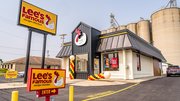News
Bloomberg puts Burger King CEO’s age, experience under microscope
July 25, 2014
Bloomberg Businessweek’s cover today shows a booster seat on top of a throne with the accompanying headline, "Burger King is run by children." The story’s spotlight centers on CEO Daniel Schwartz, who is 33 years old and one of the youngest CEOs of a large public company this side of Silicon Valley.
Schwartz, who is Burger King’s 21st CEO and brings in a $700K annual salary, spent a decade on Wall Street after graduating from Cornell, and has no quick-service restaurant experience, a recurring theme throughout the story, which wonders "will the kids save BK or ultimately destroy it?"
Unlike his 20 predecessors, Schwartz is faced with a staggering roster of new eating-out competition, such as Chipotle and Panera. Schwartz’s CFO, Josh Kobza, is 28. The North American operations president, Alex Macedo, is 36. And the head of investor relations, Sami Siddiqui, is 29. This is notable because the average age of a S&P 500 CEO is 53, the story said.
It also opined that Burger King is "behaving more like a startup than a burger chain." The company was bought in 2010 by 3G Capital and Schwartz is an "apostle of 3G’s ferocious approach to cost reduction," the story said.
These efforts have been overviewed in recent presentations. The company’s private jet was sold, embellished offices made way for an open-office floor plan. Phone bills were combed through line by line and employees were held accountable.
Skeptics contributing to the story wondered on record what the objectives were with such penny pinching.
"After unloading more than 1,200 restaurants, the company’s corporate head count has fallen from 38,884 to 2,425 in 2013. Now its income flows almost entirely from royalty fees from franchisees, on average 4 percent of franchisees’ monthly revenue. That’s less money than before overall, but Burger King has become a cash machine. And 3G hasn’t been shy about helping itself to some of that money," the story said.
Still, with a heavy focus on emerging international markets, and a return to Wall Street in 2012 in a $4.6B deal, some skepticism falls by the wayside.
"These things are seemingly working at Burger King and causing questions to be asked about the strategy of others in fast food," Analyst David Palmer told Bloomberg. "Like, why aren’t you doing what they’re doing?"
For Q1, Burger King’s sales were up 2 percent. This is compared to McDonald’s 0.5 percent.









